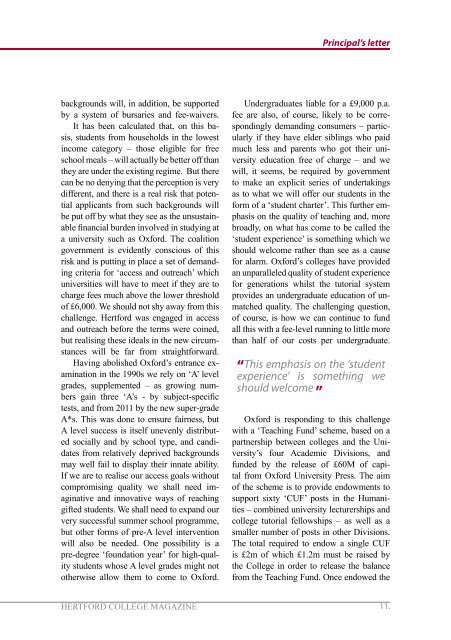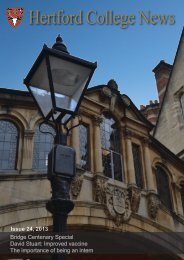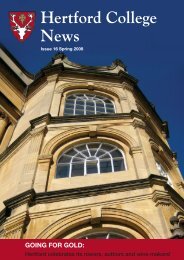2011 Hertford College Magazine (Issue 91)
2011 Hertford College Magazine (Issue 91)
2011 Hertford College Magazine (Issue 91)
You also want an ePaper? Increase the reach of your titles
YUMPU automatically turns print PDFs into web optimized ePapers that Google loves.
ackgrounds will, in addition, be supported<br />
by a system of bursaries and fee-waivers.<br />
It has been calculated that, on this basis,<br />
students from households in the lowest<br />
income category – those eligible for free<br />
school meals – will actually be better off than<br />
they are under the existing regime. But there<br />
can be no denying that the perception is very<br />
different, and there is a real risk that potential<br />
applicants from such backgrounds will<br />
be put off by what they see as the unsustainable<br />
financial burden involved in studying at<br />
a university such as Oxford. The coalition<br />
government is evidently conscious of this<br />
risk and is putting in place a set of demanding<br />
criteria for ‘access and outreach’ which<br />
universities will have to meet if they are to<br />
charge fees much above the lower threshold<br />
of £6,000. We should not shy away from this<br />
challenge. <strong>Hertford</strong> was engaged in access<br />
and outreach before the terms were coined,<br />
but realising these ideals in the new circumstances<br />
will be far from straightforward.<br />
Having abolished Oxford’s entrance examination<br />
in the 1990s we rely on ‘A’ level<br />
grades, supplemented – as growing numbers<br />
gain three ‘A’s - by subject-specific<br />
tests, and from <strong>2011</strong> by the new super-grade<br />
A*s. This was done to ensure fairness, but<br />
A level success is itself unevenly distributed<br />
socially and by school type, and candidates<br />
from relatively deprived backgrounds<br />
may well fail to display their innate ability.<br />
If we are to realise our access goals without<br />
compromising quality we shall need imaginative<br />
and innovative ways of reaching<br />
gifted students. We shall need to expand our<br />
very successful summer school programme,<br />
but other forms of pre-A level intervention<br />
will also be needed. One possibility is a<br />
pre-degree ‘foundation year’ for high-quality<br />
students whose A level grades might not<br />
otherwise allow them to come to Oxford.<br />
HERTFORD COLLEGE MAGAZINE<br />
Principal’s letter<br />
Undergraduates liable for a £9,000 p.a.<br />
fee are also, of course, likely to be correspondingly<br />
demanding consumers – particularly<br />
if they have elder siblings who paid<br />
much less and parents who got their university<br />
education free of charge – and we<br />
will, it seems, be required by government<br />
to make an explicit series of undertakings<br />
as to what we will offer our students in the<br />
form of a ‘student charter’. This further emphasis<br />
on the quality of teaching and, more<br />
broadly, on what has come to be called the<br />
‘student experience’ is something which we<br />
should welcome rather than see as a cause<br />
for alarm. Oxford’s colleges have provided<br />
an unparalleled quality of student experience<br />
for generations whilst the tutorial system<br />
provides an undergraduate education of unmatched<br />
quality. The challenging question,<br />
of course, is how we can continue to fund<br />
all this with a fee-level running to little more<br />
than half of our costs per undergraduate.<br />
“ This emphasis on the ‘student<br />
experience’ is something we<br />
should welcome ”<br />
Oxford is responding to this challenge<br />
with a ‘Teaching Fund’ scheme, based on a<br />
partnership between colleges and the University’s<br />
four Academic Divisions, and<br />
funded by the release of £60M of capital<br />
from Oxford University Press. The aim<br />
of the scheme is to provide endowments to<br />
support sixty ‘CUF’ posts in the Humanities<br />
– combined university lecturerships and<br />
college tutorial fellowships – as well as a<br />
smaller number of posts in other Divisions.<br />
The total required to endow a single CUF<br />
is £2m of which £1.2m must be raised by<br />
the <strong>College</strong> in order to release the balance<br />
from the Teaching Fund. Once endowed the<br />
11.




